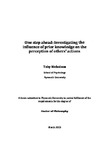One step ahead: Investigating the influence of prior knowledge on the perception of others’ actions
| dc.contributor.supervisor | Bach, Patric | |
| dc.contributor.author | Nicholson, Toby | |
| dc.contributor.other | School of Psychology | en_US |
| dc.date.accessioned | 2015-10-16T13:23:33Z | |
| dc.date.available | 2015-10-16T13:23:33Z | |
| dc.date.issued | 2015 | |
| dc.identifier | 10301321 | en_US |
| dc.identifier.uri | http://hdl.handle.net/10026.1/3660 | |
| dc.description.abstract |
Historically, a dominant view has been that we understand others by directly matching their actions to our own motor system, emphasising the importance of bottom-up processes during social perception. However, more recent theories suggest that instead we actively anticipate others actions based upon intentions inferred outside of the motor system, from social cues such as language, eye gaze and object information. Across 13 experiments, the established representational momentum paradigm, as well as a cross-modal visuotactile paradigm were employed to test the hypothesis that people’s perceptual processes while observing the actions of others would be affected by such top-down cues about the actor’s intentions. We found, first, that people overestimate other people’s actions in the direction of motion. Importantly, these overestimations were directly influenced by social cues. Saying or hearing a word congruent with a subsequently observed action resulted in the action being perceived as further along its trajectory. Second, we found that people anticipate the tactile outcomes of other people’s actions with their own sensory tactile systems but that the mechanisms differed for bottom-up and top-down driven predictions. In a task in which people had to detect tactile stimulation while watching others, seeing impending hand-object contact increased the bias to perceive tactile stimulation, even when there was none, while impending contact that could not be seen but only inferred increased tactile sensitivity. These findings are discussed in the context of recent theories of top-down predictive processing during social perception and from the perspective of multisensory integration. | en_US |
| dc.language.iso | en | en_US |
| dc.publisher | Plymouth University | en_US |
| dc.subject | Psychology | en_US |
| dc.subject | Perception | en_US |
| dc.subject | Social cognition | en_US |
| dc.subject | Prediction | en_US |
| dc.title | One step ahead: Investigating the influence of prior knowledge on the perception of others’ actions | en_US |
| dc.type | Thesis | |
| plymouth.version | Full version | en_US |
| dc.identifier.doi | http://dx.doi.org/10.24382/1462 | |
| dc.identifier.doi | http://dx.doi.org/10.24382/1462 |
Files in this item
This item appears in the following Collection(s)
-
01 Research Theses Main Collection
Research Theses Main


